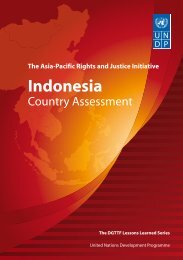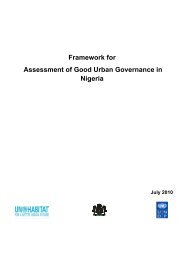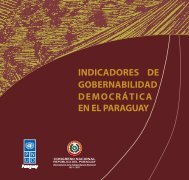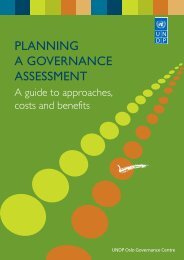A Users' Guide to Measuring Local Governance
A Users' Guide to Measuring Local Governance
A Users' Guide to Measuring Local Governance
You also want an ePaper? Increase the reach of your titles
YUMPU automatically turns print PDFs into web optimized ePapers that Google loves.
13<br />
Social Audit of <strong>Local</strong> <strong>Governance</strong> (Bosnia and Herzegovina)<br />
Producer<br />
The World Bank Institute, the Bank’s ECA (Europe<br />
and Central Asia) Region and the Government of<br />
Austria<br />
His<strong>to</strong>ry<br />
A questionnaire for conducting a Social Audit of<br />
<strong>Local</strong> <strong>Governance</strong> was developed at the end of<br />
2006 for Bosnia and Herzegovina (BiH). It was<br />
applied in twenty municipalities in the country in<br />
order <strong>to</strong> provide the WBI with information related<br />
<strong>to</strong> the provision of public goods and services by<br />
local governments and, eventually, <strong>to</strong> support<br />
the development of baseline measures for local<br />
governance in the country.<br />
Objectives<br />
The Social Audit of <strong>Local</strong> <strong>Governance</strong> is the first<br />
step of a World Bank programme aimed at<br />
strengthening the capacity of local governments<br />
in Bosnia and Herzegovina (BiH) and improving<br />
the accountability of municipalities <strong>to</strong> their<br />
citizens. This first phase aimed <strong>to</strong> obtain specific<br />
information on the degree of citizen participation<br />
and transparency in the public management cycle<br />
and on citizen satisfaction with the delivery of<br />
essential municipal services. The second phase of<br />
this programme will collect fiscal and financial<br />
information in each municipality. The result of the<br />
two phases will contribute <strong>to</strong> the creation of<br />
baseline measures for local governance indica<strong>to</strong>rs<br />
against which progress can be moni<strong>to</strong>red.<br />
Applicability<br />
This <strong>to</strong>ol has been primarily developed for local<br />
governments in Bosnia and Herzegovina (BiH).<br />
While helping local governments <strong>to</strong> design<br />
relevant capacity building programmes, it would<br />
also assist the World Bank in defining lending<br />
operations in the same area. It could also be used<br />
as a template for other countries wishing <strong>to</strong><br />
improve the quality of local governance.<br />
Types and sources of data used<br />
Data collection is mainly through household<br />
surveys. Focus group discussions and face-<strong>to</strong>-face<br />
in-depth interviews are also used. The information<br />
relative <strong>to</strong> the first part of the programme<br />
(household surveys) is subjective.<br />
Methodology<br />
The Social Audit of <strong>Local</strong> <strong>Governance</strong> is conducted<br />
through household surveys organised in three<br />
parts: the first one concerns basic household<br />
information; the second one is related <strong>to</strong><br />
respondents’ experience of 10 essential public<br />
services (housing conditions, local roads, transport,<br />
waste removal, water supply, sanitation, heating,<br />
electricity, health facilities, education – including<br />
pre-school education); the third one deals<br />
with local governance while focusing on local<br />
government authorities and citizen participation<br />
in the municipality. The questions relate <strong>to</strong> the<br />
technical details of various services provided,<br />
citizens’ access and usage, and citizens’ satisfaction<br />
with service delivery. A <strong>to</strong>tal of 1997 face-<strong>to</strong>-face<br />
interviews (one respondent per household) were<br />
carried out in 343 settlements communities across<br />
20 municipalities in Bosnia and Herzegovina.<br />
Key ac<strong>to</strong>rs/stakeholders<br />
Citizens are the main stakeholder in this process as<br />
information is collected directly from them<br />
through household surveys. The results of the<br />
audit are expected <strong>to</strong> be used by the WBI and by<br />
local governments <strong>to</strong> design a capacity building<br />
programme at the municipal level.<br />
Results reporting format<br />
Boxes 6 and 7 show some results from the<br />
preliminary qualitative survey organised in four<br />
municipalities; and examples of two questions<br />
related <strong>to</strong> the local governance theme and taken<br />
from the survey questionnaire. Results from the<br />
first survey in the twenty municipalities are not yet<br />
publicly available.<br />
Coverage<br />
20 selected municipalities across Bosnia and<br />
Herzegovina.<br />
A Users’ <strong>Guide</strong> <strong>to</strong> <strong>Measuring</strong> <strong>Local</strong> <strong>Governance</strong> 107




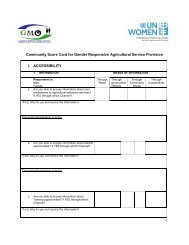
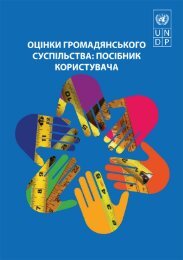
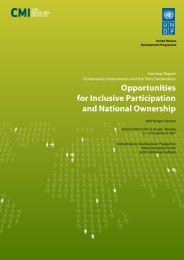
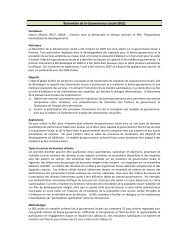
![GuÃa del Usuario ] - Governance Assessment Portal](https://img.yumpu.com/44740603/1/190x253/gua-a-del-usuario-governance-assessment-portal.jpg?quality=85)
